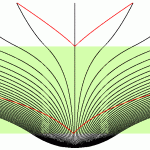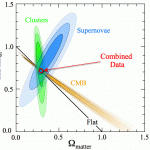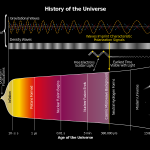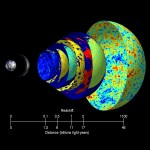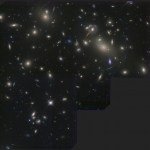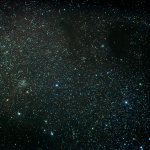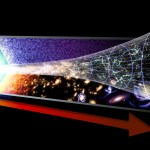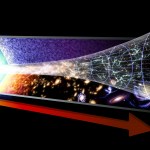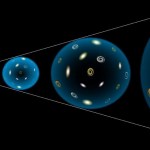Big Bang
“The total number of people who understand relativistic time, even after eighty years since the advent of special relativity, is still much smaller than the number of people who believe in horoscopes.” -Yuval Ne’eman
It's been 13.8 billion years since the Big Bang for us, and when we look out at a distant object in the Universe, we're seeing it as it was in the past. Its age -- as it appears -- is determined only by how long the light took for it to travel from that object to our eyes, but to someone living there, it will also appear that the Universe is 13.8 billion years old.
Image credit…
“Despite its name, the big bang theory is not really a theory of a bang at all. It is really only a theory of the aftermath of a bang.” –Alan Guth
If we trace the evolution of our Universe back in time, we can arrive at a time before there were organic molecules, rocky planets, heavy elements, galaxies, stars, or even neutral atoms. The farther back we go, the hotter the Universe gets, the higher in density and temperature, and more uniform. But at some point, this hot, dense, expanding state ceases to describe our Universe.
Image credit: Lawrence Berkeley National Laboratory.
Because…
“The radiation left over from the Big Bang is the same as that in your microwave oven but very much less powerful. It would heat your pizza only to -271.3°C, not much good for defrosting the pizza, let alone cooking it.” –Stephen Hawking
Imagine you traveled out into empty space. Away from any and all planets, stars, galaxies, and matter in general: normal or dark. Would you simply find yourself immersed in an empty, energy-free abyss? Not so! You'd still be bathed in radiation: not just from distant starlight, but from the afterglow of the Big Bang itself.
Image credit: ESA and…
“It’s hard to build models of inflation that don’t lead to a multiverse. It’s not impossible, so I think there’s still certainly research that needs to be done. But most models of inflation do lead to a multiverse, and evidence for inflation will be pushing us in the direction of taking [the idea of a] multiverse seriously.” -Alan Guth
You've heard the question asked before about controversial or new-style pieces of work, "But is it art?" Well, what about the scientific counterpart of that?
Image credit: Moonrunner Design, via http://news.nationalgeographic.com/news/2014/03/140318-multiverse…
"Were the succession of stars endless, then the background of the sky would present us a uniform luminosity, like that displayed by the Galaxy-since there could be absolutely no point, in all that background, at which would not exist a star." -Edgar Allan Poe
The master of the macabre, little known to most, was actually a very curious and astute armchair scholar of the cosmos. And when he looked out at the physical Universe, one of the most puzzling facts about it was the darkness of the night sky itself. Back in the 1820s, Heinrich Olbers put forth his famous paradox: that if the night sky…
“Revolutions are something you see only in retrospect.” -Alan Greenspan
If there's one thing you can be certain of when it comes to the fundamental, scientific truths of our Universe, it's this: someday, in the not too distant future, those truths will be superseded by more fundamental ones. And even those, quite likely, won't be the final truths, but just one step further along the line towards our understanding of reality.
Image credit: Philosophy of Cosmology / University of Oxford, via http://philosophy-of-cosmology.ox.ac.uk/cosmos.html.
Does this mean that we've necessarily got…
“For my part I know nothing with any certainty, but the sight of the stars makes me dream.” -Vincent Van Gogh
When we look out into the Universe, farther back to greater distances, we're also looking back in time, farther and farther into the past. If we could look back far enough, close enough to the Big Bang, we'd be able to see the very first stars ever formed in the Universe: stars formed from the Big Bang's leftover material itself.
Image credit: European Southern Observatory (ESO).
We'd never been able to find these before, but by looking at a starburst galaxy at extremely high…
“Scientific ideas should be simple, explanatory, predictive. The inflationary multiverse as currently understood appears to have none of those properties.” -Paul Steinhardt, 2014
Cosmic inflation is alternately talked about by serious scientists as either the definitive beginning to our Universe, the thing that happened before and set up the Big Bang with absolute certainty, or a speculative fiction that can never be falsified, leading to nothing but untestable predictions and things that only mattered after-the-fact of their discovery.
Image credit: Bock et al. (2006, astro-ph/0604101);…
“Nothing is lost… Everything is transformed.” -Michael Ende
If you take all the kinetic motion out of a system, and have all the particles that make it up perfectly at rest, somehow even overcoming intrinsic quantum effects, you'd reach absolute zero, the theoretically lowest temperature of all. But what about the other direction? Is there a limit to how hot something can theoretically get?
Image credit: A.Greg; Wikimedia Commons user Greg L.
You might think not, that while things like molecules, atoms, protons and even matter will break down at high enough temperatures, you…
“We are told to let our light shine, and if it does, we won’t need to tell anybody it does. Lighthouses don’t fire cannons to call attention to their shining- they just shine.” -Dwight L. Moody
When it comes to the farthest thing we can see in the Universe, that's the Cosmic Microwave Background, or the leftover glow from the Big Bang, emitted when the Universe was a mere 380,000 years old. But what, exactly, does this mean?
Image credit: ESA and the Planck Collaboration.
Does it mean that we're seeing the "edge" of the Universe? Does it mean that there's nothing to see, farther back…
“Those who know that the consensus of many centuries has sanctioned the conception that the earth remains at rest in the middle of the heavens as its center, would, I reflected, regard it as an insane pronouncement if I made the opposite assertion that the earth moves.” -Nicolaus Copernicus
There are certain words that simply get people's hackles raised, shutting off the part of their brain that normally responds to reason and instead results in an emotional response taking over. For some, that word is "theory," one of the words with the biggest gap between its colloquial and scientific uses…
“Silently, one by one, in the infinite meadows of heaven,
Blossomed the lovely stars, the forget-me-nots of the angels.” -Longfellow
The cosmic microwave background is a thing of beauty, as not only does its uniform, cold temperature reveal a hot, dense past that began with the hot Big Bang, but its fluctuations reveal a pattern of overdensities and underdensities in the very early stages of the Universe.
Image credit: NASA / WMAP science team, via http://map.gsfc.nasa.gov/mission/sgoals_parameters_spect.html.
It's fluctuations just like these that give rise to the stars, galaxies, groups…
“Light thinks it travels faster than anything but it is wrong. No matter how fast light travels, it finds the darkness has always got there first, and is waiting for it.” -Terry Pratchett
If you want, you can imagine back in the Universe to a time before it looked anything like ours did. Before there was life, before there were planets, galaxies, stars, or even neutral atoms. Yet going back even to those times, there was still light, and there were still photons.
Image credit: the Cosmic Microwave Background of Penzias and Wilson, via http://astro.kizix.org/decouverte-du-17-mars-2014-sur-le-…
“It followed from the special theory of relativity that mass and energy are both but different manifestations of the same thing — a somewhat unfamiliar conception for the average mind.” -Albert Einstein
In physics, we're always on that quest for the next frontier: the next order of magnitude higher in energy, the next order of magnitude closer to absolute zero, the next extra decimal place in our quest towards the speed of light. As far as we've come in terms of pushing the frontiers, we're always striving to go a little bit farther.
Image credit: RHIC collaboration, Brookhaven, viahttp://…
“We like to admit to only that which already glows, although it is nobler to support brightness before it glows, not afterwards.” -Dejan Stojanovic
When we look back to greater and greater distances in the Universe, we're looking back to earlier and earlier times as well. At some point, we can see far enough back that we reach the location at which the Universe cooled enough to first form stable, neutral atoms.
Image credit: NASA / CXC / M.Weiss.
But this is no nearby location: it's presently located some 45.3 billion light-years away! All the stars, galaxies, clusters and gas clouds that…
“These theories were based on the hypothesis that all the matter in the universe was created in one big bang at a particular time in the remote past.” -Fred Hoyle
It's making headlines everywhere we go: the recent paper stating that quantum equations prove that there is no Big Bang.
Image credit: ESA/Hubble & NASA;Acknowledgement: Judy Schmidt.
Is that even possible? Honestly, it depends on which definition of the Big Bang you're using. As it turns out, there are two of them, and there's a good (historical) reason for that. But in the context of what we know today, one of…
“Every generation of physicists solves some old puzzles and finds some new ones.” -Dr. Kendrick Smith
A century ago, no one could have envisioned the Universe we have today. From a Universe governed by Newton's and Maxwell's laws, consisting only of the Milky Way and the objects within, who could have imagined the new forces, interactions, particles and discoveries that the 20th century brought with it?
Image credit: NASA / GSFC, via http://cosmictimes.gsfc.nasa.gov/universemashup/archive/pages/expanding….
Yet not only are we here today, but there are a whole new set of unanswered…
If you want to map the entire sky -- whether you're looking in the visible, ultraviolet, infrared or microwave, your best bet is to go to space. Only high above the Earth's atmosphere can you map out the entire sky, with your vision unobscured by anything terrestrial.
Image credit: ESA and the Planck collaboration.
But that costs hundreds of millions of dollars for the launch alone! What if you've got new technology you want to test? What if you still want to defeat most of the atmosphere? (Which you need to do, for most wavelengths of light.) And what if you want to make observations on…
“The only reason for time is so that everything doesn’t happen at once.” -Albert Einstein
And yet, this is a very good reason! We need things to happen in stages: you can't form human beings before you form planets (that would be bad); you can't form stars before you form atoms (also bad); you can't form atomic nuclei before you get rid of antimatter (still bad).
Image credit: Addison Wesley.
But somehow, despite having very little direct evidence for what happened in the early Universe, we tend to give timelines of precisely when various events happened. For this week's Ask…
“I want to stand as close to the edge as I can without going over. Out on the edge you see all the kinds of things you can’t see from the center.” -Kurt Vonnegut
The Universe is expanding and cooling, with all but a few of the closest galaxies receding from our view. In fact, the farther away an object is, the faster it appears to recede.
Image credit: E. Siegel.
This may sound an awful lot like an explosion to you, and the name "the Big Bang" sure gives that same implication, doesn't it? Yet despite these facts, it turns out that the idea that the Universe has a center is completely…

